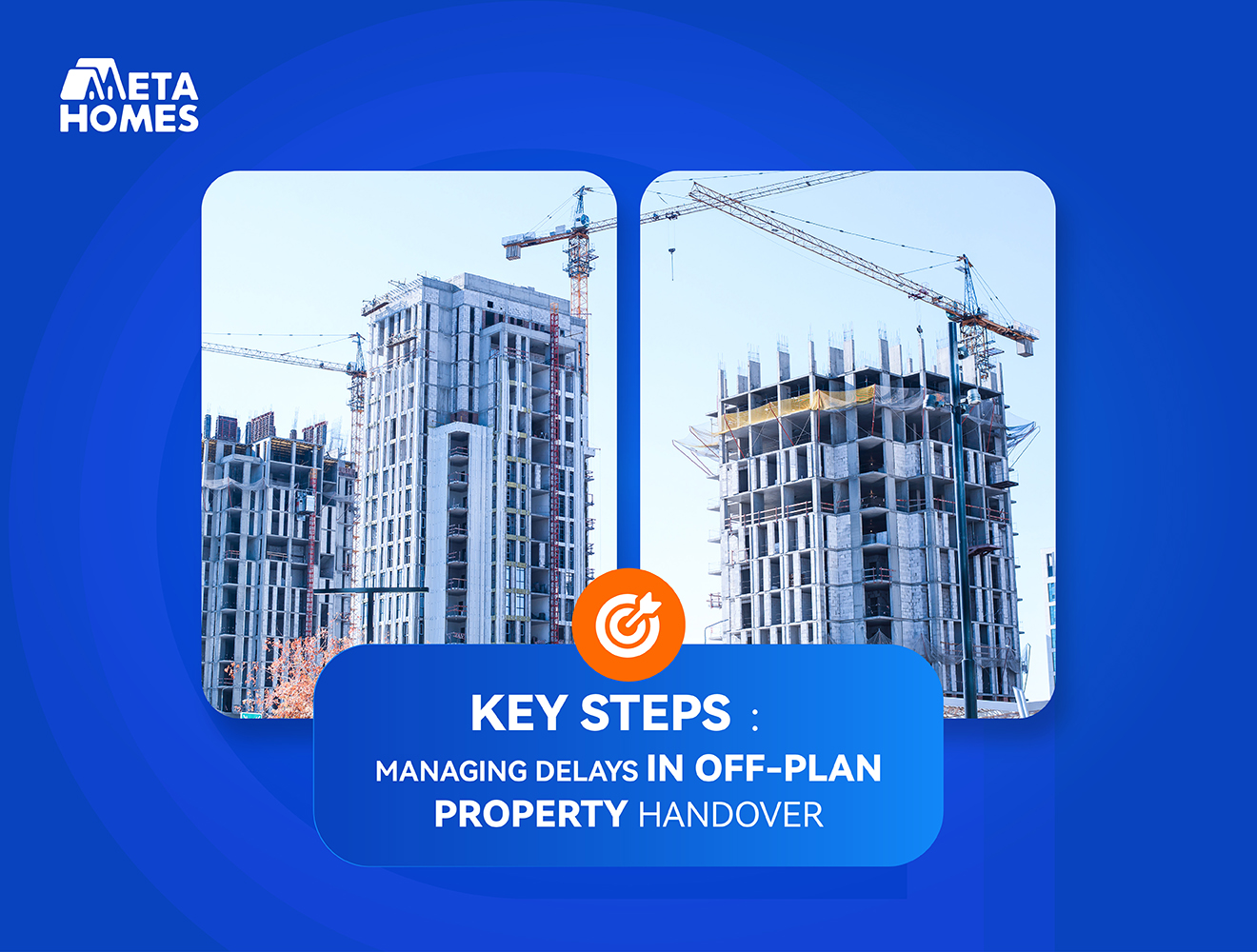
Off-plan property investment has become very popular in Dubai, where you can buy a property at a lower cost before completion.
With attractive payment plans and a booming real estate market, many investors see off-plan properties in Dubai as a way to make good returns.
One of the major challenges faced by off-plan property investors in Dubai is the delay in handovers. These delays can be frustrating and costly, especially for those who want to rent or move in soon after completion.
Delays can be costly for buyers who are making mortgage payments and also paying rent or for investors who expect income from their rental properties in Dubai.
Dubai’s real estate market is highly regulated and developers are supposed to follow the rules but delays can still happen.
Construction delays, regulatory approvals delays, or financial issues with the developer can push back the project timelines and be frustrating for buyers who are waiting for their off-plan property to be completed.
In Dubai, the real estate market is regulated, but despite the rules, delays can still happen. The issue often arises due to construction delays, financial issues, or other unforeseen circumstances with the developer.
For buyers delays can be frustrating, especially if they have made plans around the completion date. But there are practical steps you can take to manage these delays and work towards resolving them.
Off-Plan Property Handover Delays
An off-plan property is a property purchased before construction is completed and a handover is when the buyer gets possession of the property.
Developers usually provide an estimated completion date but it’s not uncommon for that date to be extended.
Construction can be delayed for many reasons:
-
Developer Issues: Financial issues, poor management or changes in the developer’s business can cause delays.
-
Construction Delays: Shortage of materials, labor strikes, or bad weather can slow down construction.
-
Regulatory Delays: Sometimes issues with approvals from the authorities can cause a hold-up in the project.
When faced with delays, buyers should be proactive and informed. Below are the steps to manage to delay buying off-plan property handovers effectively.
1. Make All Payments and Paperwork Complete
The first and most important step in managing a delayed handover is to ensure all your financial obligations are up to date.
In many cases, a delay in handover can be due to outstanding payments or incomplete paperwork. Check if all payments to the developer have been made on time and double-check if all required documents have been submitted and processed.
If your payments or documents are incomplete, this could be the reason for the delay. Fixing these issues can sometimes resolve the delay and the developer can move forward by handing over the property.
2. Visit the Site and Check the Progress
Stay informed about the physical progress of your off-plan property. If you think there might be a delay, visit the site to check on the progress firsthand.
Meeting with the developer in person can also help clarify the situation and give you an idea of the expected completion date.
You can also check the project status on the Dubai Land Department (DLD) website, which has an updated list of off-plan projects.
DLD tracks the progress of the developments and provides estimated completion dates for the ongoing projects.
3. Talk to the Developer
Communication with your developer is key. Contact them and discuss the reasons for the delay and possible solutions.
Many times developers will be willing to negotiate or offer compensation for delays such as rent reimbursement or extended post-handover payment plans.
Also, review your Sales and Purchase Agreement (SPA) which usually has a clause for delayed handovers. This clause will outline the developer’s obligations and your rights in case of a delay. Understanding these terms will help you negotiate better.
4. Check if the Project is Cancelled by RERA
If your handover is significantly delayed, you should check if the project is cancelled. The Real Estate Regulatory Agency (RERA) has the power to cancel projects if specific conditions are met.
If a project is canceled, it will be transferred to a liquidation committee and the Dubai Real Estate Court will oversee the settlement of funds for buyers.
You can check the project status on the Dubai Land Department (DLD) website which will show if the project is canceled. In such cases, buyers are entitled to compensation or refund.
5. Seek Legal Help and File a Case if Necessary
If negotiations with the developer don’t yield a solution you may need to consider legal action. Filing a case should be the last resort but it’s good to know your options if the delay goes beyond the grace period in your SPA (usually one year from the initial handover date).
Here are the Steps to Follow to File a Case:
-
Get a Property Lawyer: Contact the Dubai Real Estate Court to get a lawyer who specializes in real estate disputes. They will assess your case and guide you through the process.
-
Claim Compensation: You can claim compensation based on your contract terms, including the return of your deposit and interest payments.
-
Contract Cancellation: In some cases, you can cancel the contract and get compensation for the amount paid if the contract allows for it.
Legal action can be time-consuming and costly so it’s best to exhaust all other options before going down this route.
Key Steps to Avoid Delays in Future Off-Plan Property Investments
While delays are sometimes inevitable, there are ways to minimize the risk of delayed handover in the future.
Here are some useful guidelines to consider when investing in off-plan properties in Dubai:
-
Investigate the Developer: Prior to investing, look into the developer’s history and past performance. Have they completed projects on time? What’s their reputation in the market? Talk to other investors and review past projects to get valuable insights.
-
Verify the Developer’s Escrow Account: As per Dubai law, all developers are required to have a registered escrow account with the Dubai Land Department (DLD). Payments made by buyers are deposited into this account and can only be accessed by the developer once specific construction milestones are met. This protects buyers from fraud and ensures the project is progressing.
-
Verify RERA Registration: Always check if the developer and the project are registered with RERA. This ensures the development is monitored by the authorities and is in compliance with Dubai’s real estate laws.
-
Review the SPA Carefully: Before signing any contract review the terms and conditions, especially the clauses related to delays. Understanding your rights and the developer’s obligations will help you navigate any issues that may arise.
-
Choose Payment Plans Linked to Milestones: Many developers offer payment plans linked to construction milestones or post-handover payments. Opt for these plans to have some financial flexibility and to tie your payments to the project’s progress.
FAQs
What is the Dubai Land Department (DLD)?
DLD is a government entity that supervises real estate transactions in Dubai to ensure all projects are compliant.
What are the advantages of buying off-plan properties?
The Dubai Land Department (DLD) is a government entity that oversees real estate transactions in Dubai, ensuring that all projects adhere to regulations.



Comments (1)
Dang k'y binancesays:
January 30, 2026 at 4:16 amYour article helped me a lot, is there any more related content? Thanks! https://accounts.binance.info/register-person?ref=IXBIAFVY